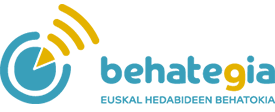The Badalab laboratory is the result of the Innovation Levers process in the Basque pro-language movement, which is located at the intersection of language and innovation. Its objective is to use Euskera in future scenarios and interaction systems, provoking new questions and unusual collaborations. Based on experimentation, its governance model is pioneering, as being an organization of the public sector, in its scope of decision public institutions and social agents are equated.
What is Badalab?
Badalab is the linguistic innovation laboratory located at the intersection of language and innovation. Based on language, it has two functions: to incorporate innovation in the revitalization process of the Basque country and to incorporate the linguistic variable in the innovation processes. It aims to be a safe and open experimentation space, promoting equality among people.
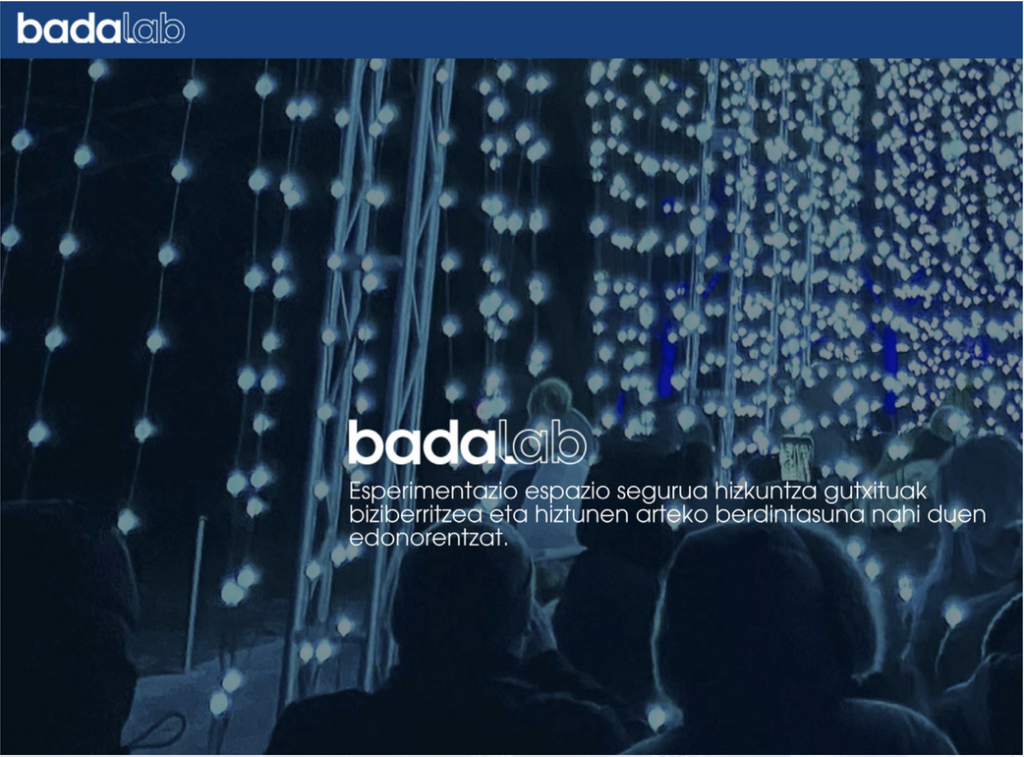
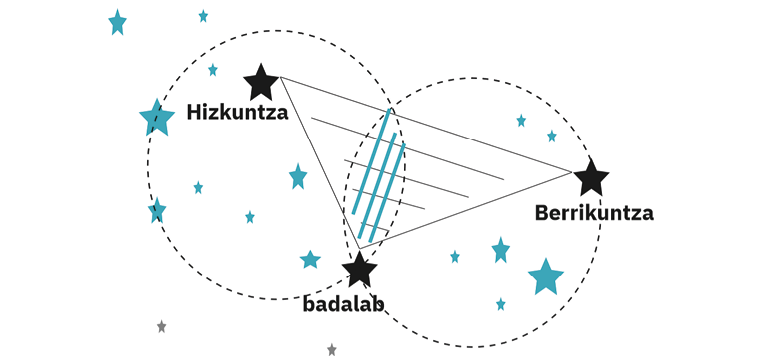
Badalab's objective is to experiment and contribute from innovation so that the Basque country continues to be used in the future, promoting equality, respect, social justice and empathy among speakers. It will propose new questions to achieve the goal and seek new ways of doing/being and atypical collaborations.
Currently, Badath"s starting question is:
“How does the community of speakers* aspire to be an agent and a benchmark in diversity in the age of digital society?”
**A community that wants to develop from Euskera, also in Basque.
The main elements of the question are three, the development of the community at its center in search of its desirable future, the digital/audiovisual society contextualizing and the diversity understood as a framework of wealth and influence. These are the fields of work and the intention of the ecosystem that Badalabe wants to articulate.
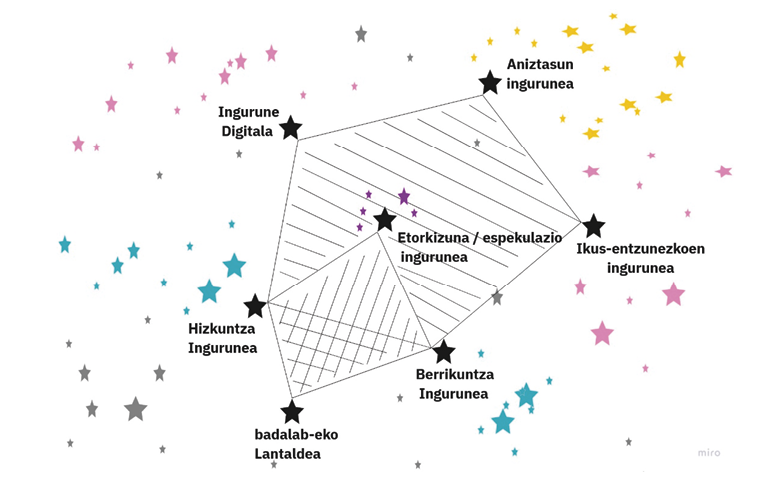
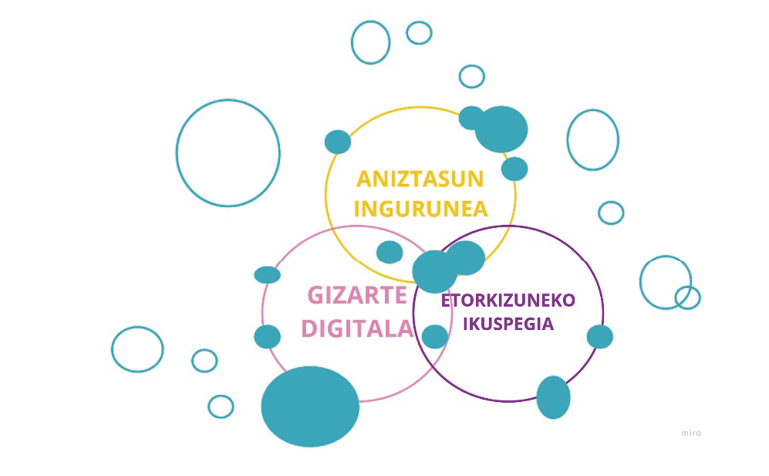
All this is based on the assertion that in the Basque Country there are numerous agents, institutions, initiatives and projects underway, being the priority of Badalabe to strengthen them (the three great circles) by providing the value of innovation. At the same time, if you look at areas where no work has been done, the laboratory will bring with it experimental initiatives, always within the alliance (small filled circles).
Badalabe will make available for this activity the space, tools and experiences: the physical space in the headquarters of Errentería and the virtual space that is being built; the tools of accompaniment, methodology, dynamization, scholarship, etc. ; community sessions to promote collective intelligence and experiences of inspiration and/or learning, designed specifically to feed the ecosystem and the speaking community, in each case.
"If it has a name, it is"
The Badalab Linguistic Innovation Consortium was established in 2021, integrating various public institutions, social agents and companions of the Basque Country. To reach this point, it was necessary to combine two itineraries that were being developed in parallel and with little friction: on the one hand, the process of public-social deliberation called the Levers of Basque Culture and, on the other, the innovation initiative called Building the Future (EE) of the Provincial Council of Gipuzkoa.
The clear conclusion of the first process is that a stable reference center would systematically work the innovation needed to promote the use of Euskera. Meanwhile, reference centers were created for experimentation with Building the Future, focusing on cooperative governance.
In the 2019-21 section, intense work was undertaken to integrate both dynamics, always within the logic of public-social cooperation.
Badalab was formed as a joint consortium in July 2021 and is a reference centre in Eraikiz, based in Errenteria (Gipuzkoa). The Consortium has a special brand of creation, arises from public-social cooperation and integrates it into its structure, building shared governance.
Badalab is a public sector entity affiliated with the Provincial Council of Gipuzkoa. However, Badalabe’s main point of decision is shared: the statutes grant the Deputy the right to appoint four of the fifteen members of the Governing Board, and the fifth that corresponds to the public entities is the representative of the Municipality of Errentería, another five are designated by the social agents and the last five are travelling companions.
The consortium consists of: The Provincial Council of Gipuzkoa, the Municipality of Errentería, the Cluster of Sociolinguistics, the Council of the Basque Language, Langune, the LAB laboratory, the University of the Basque Country, EITB and Euskaltzaindia. The Vice-President for Linguistic Policy of the Basque Government, Emun, Elhuyar and AEK are also members of the Governing Commission.
This shared governance responds to Badalabe’s firm conviction that only the combination of social initiative and institutional capacity will allow the entire Basque community to develop a country.
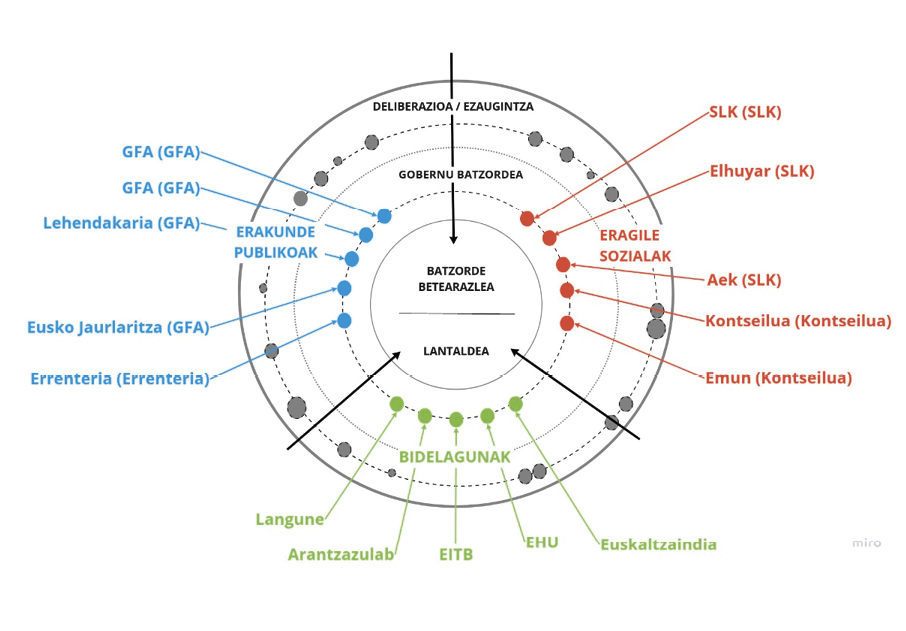
A pioneering governance model
The first laboratory experiment has become the same governance as Badalabe, as the governance drawn in the consortium’s statutes had to be carried out.
The development of the strategic plan to experiment was used. After elaborating the basic proposal, it was enriched with the members of the Governing Board in the asynchronous individual interviews. Finally, the proposal was rounded up with contributions from the actors and persons meeting in the Deliberative Forum.
The Deliberation Forum is the body provided for in the statutes of the Consortium and consists of 35 persons. Of these, 15 are members of the Governing Board, because in these first steps it is intended to ensure dialogue between the two bodies and that the decisions taken will be worked out, discussed and contrasted with more actors/persons. The remaining 20 people will bring diversity and wealth to dialogue, strength.
Permeable governance is what Badalab practices, open to anyone who is interested in us and us. It aims to foster interaction between different interests and perspectives in order to activate collective intelligence, enrich decisions and increase efficiency.
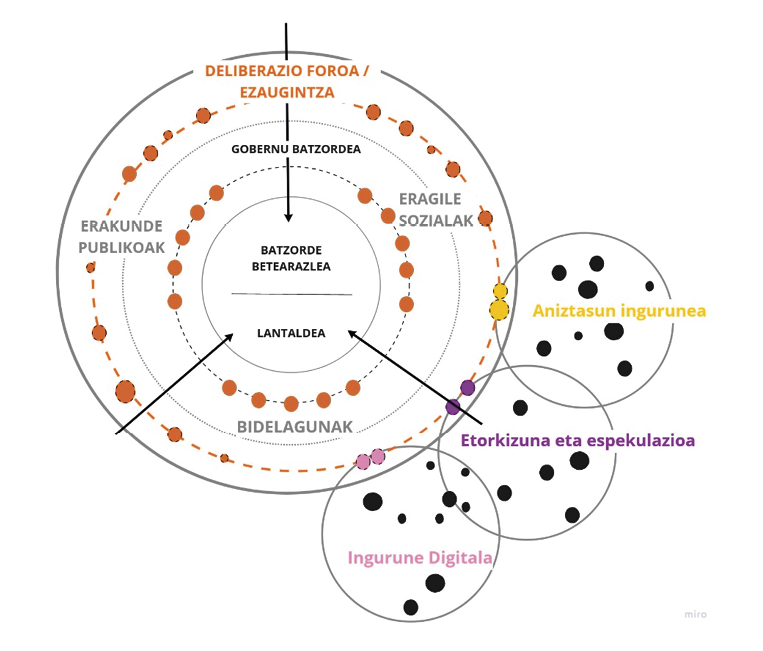
Therefore, and in order to make the Deliberation Forum non-restrictive, the statutes provide for Sectoral Deliberative Commissions. These committees are open and the participation of participants can vary in levels/intensity and time depending on the dynamics of the projects. Currently, Badalab has three deliberative commissions (digital environment, future and diversity) in place and it is the Deliberative Forum that ensures the connection between strategy and action in these lines of work.
Experimentation space for the media?
We"ll look at this question from different angles.
Before we start, one issue to highlight is that it can be a multidirectional relationship. Who is the experimental center? Badalab for the Basque media? The Basque media for Badalab? Linguistic community for Badalab and the Basque media?
Let"s round the edges.
First border: structuring and governance model. The experiment developed internally has left us meaningful learnings: we are more together, we want to work together. We truly value spaces of shared reflection, us and us, and those who have made the journey with us so far. Our learning process and defined systems are at the service of the Basque media. An invitation to jointly enrich this process of learning still alive.
Second edge: hybridization. Badalabe, as an organization starting from scratch, must build and develop everything he does from scratch. This involves intense work, but it is also an excellent opportunity to think, problematize and decide what to do, why and for what.
We"ve said a few lines above that digital society contextualizes the speaking community. Also to Badalabe. How should an organization emerge from scratch today? How do we organize Badalab from the hybrid logic? How are we going to take advantage of the virtual plaza to make a leap in the revitalization of language? What can we do differently to multiply the activation capacity of networks and screens? What do we have to do to position Euskera well in these global transformations that are taking place in the digital environment?
Third aspect: socialization and new stories. It has been identified that technology development is above use. Like the Basque. The knowledge of the language is superior to that used on the street. The technology is more developed in many lines than the known and used. What can be done to make a leap in the socialisation of technology in favour of minority languages?
In Badalabe, because we start from scratch, we have problematized our own communication strategy. Who, how and for what purpose will we tell you what? Beyond counting, can we leverage our channels to foster real dialogue and interactions?
It"s more. Our experiments aim at the development of the speaking community, they want to feed the Basque community, that community that also wants to develop from and in Euskera. What can those of us who live here contribute to the construction of a new imaginary? And can you feed other channels? The Basque media, for example?
Fourthly, to close round: the Basque media will have challenges. Surely you have a lot of crazy ideas that will seem dreamy to you. How can Badalab provide you? We are waiting for an answer.
